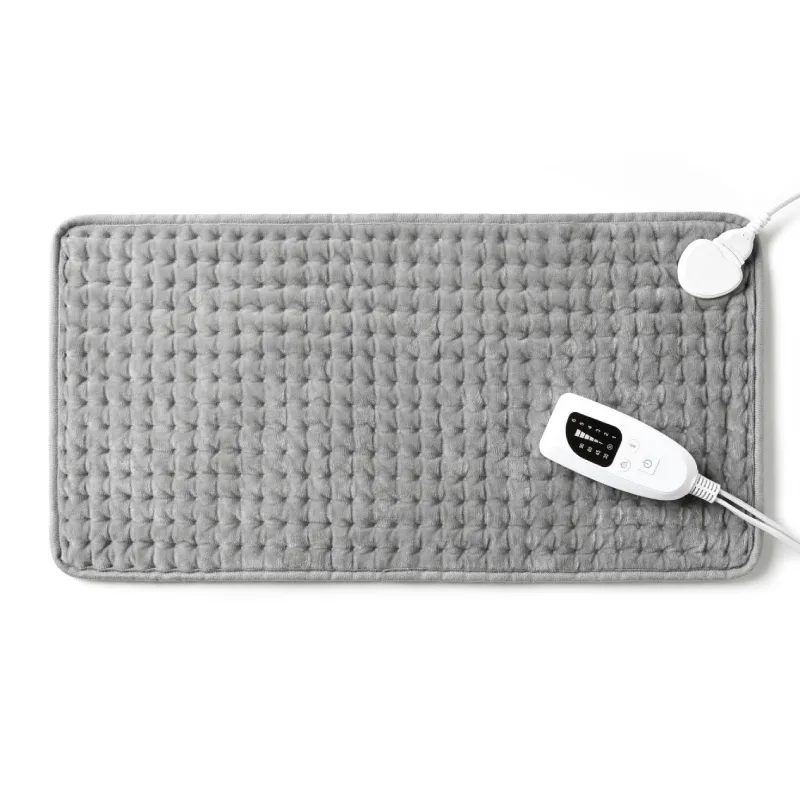
Aug . 17, 2025 03:20 Back to list
Mattress Blankets: Cozy Comfort & Ultimate Warmth for Sleep
Unveiling the Advanced Engineering of Industrial Heating and Insulation Blankets
In today's rapidly evolving industrial landscape, the efficiency and safety of thermal management systems are paramount. Components like the Mattress Blanket represent a critical innovation, designed to optimize heat retention, minimize energy waste, and ensure operational stability across diverse sectors. These specialized blankets are not merely insulators; they are precision-engineered thermal management solutions that conform to complex industrial geometries, providing targeted heating or exceptional insulation. The rising demand for sustainable and cost-effective industrial operations has propelled the development of advanced materials and smart technologies integrated into these blankets. Industry trends highlight a significant shift towards modular, customizable, and intelligent thermal solutions capable of real-time monitoring and adaptive control. This trajectory is driven by stringent environmental regulations, the escalating cost of energy, and the continuous pursuit of operational excellence, all of which underscore the indispensable role of high-performance thermal blankets in modern industrial infrastructure. Their ability to deliver consistent temperature control in challenging environments, from sub-zero conditions to extreme heat, significantly contributes to process optimization and equipment longevity.
The application spectrum of industrial blankets is remarkably broad, extending from petrochemical processing and power generation to food and beverage production, and even specialized aerospace applications. These blankets serve as a protective thermal envelope for pipes, valves, tanks, and various machinery, preventing heat loss in cold climates or dissipating excess heat in hot environments. The underlying technology often involves multi-layered designs incorporating high-performance insulating materials like aerogels, ceramic fibers, or fiberglass, encapsulated within durable, weather-resistant outer fabrics. Furthermore, the integration of advanced heating elements, such as nickel-chromium alloy wires or carbon fiber composites, allows for precise temperature regulation, which is vital for processes requiring specific thermal profiles. The emphasis on robust construction ensures resistance to harsh chemicals, abrasion, and extreme temperatures, thereby extending the service life of both the blankets and the underlying equipment. This comprehensive approach to thermal management reflects a commitment to enhancing energy efficiency and reducing the carbon footprint of industrial operations worldwide.
Precision Manufacturing: The Craftsmanship Behind Every Industrial Blanket
The manufacturing of a high-performance industrial  Mattress Blanket involves a meticulously orchestrated multi-stage process, beginning with the selection of premium-grade materials tailored for specific thermal and environmental challenges. Key materials typically include high-temperature resistant fabrics such as silicone-coated fiberglass, PTFE-coated fabrics, or specialized industrial cloths for the outer layers, providing exceptional durability and chemical resistance. Inner insulation layers vary depending on application needs, ranging from needle-punched fiberglass mats for moderate temperatures to ceramic fiber blankets or aerogel insulation for extreme thermal conditions. Heating elements, if integrated, are typically high-grade nickel-chromium (NiCr) alloy resistance wires or etched foil elements, selected for their uniform heating properties and longevity. The process flow generally commences with precision cutting of the outer fabric and insulation materials using advanced CNC cutting machines, ensuring exact dimensions for complex geometries. This is followed by the meticulous assembly of layers, often involving specialized industrial sewing techniques to create chambers for the insulation material, preventing settling or degradation over time.
Mattress Blanket involves a meticulously orchestrated multi-stage process, beginning with the selection of premium-grade materials tailored for specific thermal and environmental challenges. Key materials typically include high-temperature resistant fabrics such as silicone-coated fiberglass, PTFE-coated fabrics, or specialized industrial cloths for the outer layers, providing exceptional durability and chemical resistance. Inner insulation layers vary depending on application needs, ranging from needle-punched fiberglass mats for moderate temperatures to ceramic fiber blankets or aerogel insulation for extreme thermal conditions. Heating elements, if integrated, are typically high-grade nickel-chromium (NiCr) alloy resistance wires or etched foil elements, selected for their uniform heating properties and longevity. The process flow generally commences with precision cutting of the outer fabric and insulation materials using advanced CNC cutting machines, ensuring exact dimensions for complex geometries. This is followed by the meticulous assembly of layers, often involving specialized industrial sewing techniques to create chambers for the insulation material, preventing settling or degradation over time.
Subsequent stages involve the careful integration of heating elements, thermostats, and sensors, all wired to precise specifications and encapsulated to prevent moisture ingress and ensure electrical safety. For complex shapes or modular systems, techniques analogous to "forming" are employed, where the blanket is shaped to precisely fit the contours of the equipment it's designed to cover, sometimes involving semi-rigid components or internal support structures. Quality control is rigorous at every stage. Products undergo a series of comprehensive tests, including thermal performance validation (e.g., heat distribution uniformity, insulation effectiveness), electrical safety testing (dielectric strength, ground continuity), and material integrity checks. Adherence to international standards such as ISO 9001 for quality management, ANSI for material specifications, and often specific industry certifications like CE for European markets or UL for North America, is strictly maintained. These blankets are engineered for an extended service life, typically ranging from 5 to 15 years depending on the operating conditions and maintenance, significantly reducing replacement cycles and total cost of ownership. Their robust design, utilizing sophisticated manufacturing processes, ensures exceptional energy efficiency and superior corrosion resistance, crucial in demanding industries like petrochemicals, metallurgy, and water treatment where equipment is constantly exposed to harsh elements.
Technical Parameters and Performance Specifications
Understanding the detailed technical parameters of a high-quality Mattress Blanket is crucial for industrial buyers and engineers to ensure optimal selection and performance. These parameters dictate the blanket's suitability for specific applications, its efficiency, and its longevity. Manufacturers provide comprehensive data sheets that elaborate on everything from operating temperature ranges to material composition and power consumption. The design flexibility allows for bespoke solutions, but core performance metrics remain consistent, providing a reliable benchmark for comparison. These blankets are engineered to offer a significant return on investment through energy savings and reduced equipment wear, making them a cornerstone of modern industrial efficiency strategies.
| Parameter | Specification/Value | Notes/Benefit |
|---|---|---|
| Operating Temperature Range | -60°C to +1200°C (Application dependent) | Ensures performance in extreme environments. |
| Insulation Material | Aerogel, Ceramic Fiber, Fiberglass, Mineral Wool | Selected for specific thermal conductivity and durability. |
| Outer Fabric Material | Silicone-coated Fiberglass, PTFE-coated Fabric, High-temp Industrial Cloth | Resistance to chemicals, abrasion, UV, and weather. |
| Thermal Conductivity (Insulation) | 0.015 - 0.040 W/m·K (at 25°C) | Lower values indicate superior insulation performance. |
| Heating Element Type (for heated blankets) | NiCr (Nickel-Chromium) Alloy Wire, Carbon Fiber | Uniform heating, high efficiency, and long lifespan. |
| Power Density (for heated blankets) | 0.5 - 5.0 W/cm² (Customizable) | Determines heating speed and maximum temperature output. |
| Protection Rating | IP54 to IP68 (Depending on design) | Resistance against dust and water ingress. |
| Certifications | ISO 9001, CE, RoHS, UL (Pending/Applicable) | Ensures compliance with international quality and safety standards. |
| Lifespan | 5 - 15 Years (Dependent on operating conditions) | Long-term reliability and reduced replacement costs. |
These specifications are crucial not only for initial procurement but also for long-term operational planning and maintenance. A well-specified Mattress Blanket can lead to substantial energy savings, often reducing heat loss by up to 90% in insulated pipes and equipment, translating directly into lower operational costs and a reduced carbon footprint. Furthermore, maintaining stable process temperatures through superior insulation minimizes equipment stress, leading to fewer breakdowns and extending the operational lifespan of critical machinery. The ability to withstand harsh industrial chemicals and extreme temperatures without degradation is also a testament to the robust material science and engineering invested in these products, ensuring consistent performance even in the most demanding environments.
Application Scenarios and Strategic Advantages
The versatility of the industrial Mattress Blanket allows its deployment across an extensive range of critical industrial applications, each benefiting from its inherent advantages. In the petrochemical sector, these blankets are indispensable for maintaining optimal temperatures in pipelines, valves, and vessels carrying viscous fluids, preventing solidification and ensuring continuous flow, which is crucial for operational safety and efficiency. Similarly, in power generation plants, they insulate steam lines, turbines, and exhaust systems, drastically reducing heat loss and improving overall thermal efficiency. The metallurgical industry utilizes them for controlled cooling processes or maintaining specific temperatures in furnaces and casting equipment, contributing to material quality and energy conservation. Beyond thermal management, these blankets offer significant safety benefits by reducing surface temperatures of hot equipment, thereby mitigating burn risks for personnel in close proximity.
Furthermore, in water treatment and chemical processing, where aggressive chemicals and fluctuating temperatures are common, the corrosion resistance and durability of these blankets prevent premature equipment degradation and extend the service life of pipes and tanks. Their quick installation and removal capabilities make them ideal for maintenance operations, facilitating easy access for inspections or repairs without the extensive downtime associated with traditional rigid insulation. The custom-fit nature ensures maximum coverage and insulation effectiveness, adapting seamlessly to complex geometries and irregular surfaces that conventional insulation materials cannot accommodate. These strategic advantages, encompassing energy efficiency, enhanced safety, prolonged equipment life, and operational flexibility, collectively make the investment in a high-quality Mattress Blanket a financially sound decision for any industrial enterprise aiming for sustainable and optimized operations.
Choosing the Right Partner: Manufacturer Comparison and Custom Solutions
Selecting the right manufacturer for industrial thermal solutions, specifically a Mattress Blanket, is a critical decision that impacts long-term operational efficiency and cost-effectiveness. Key differentiators among manufacturers often include the breadth of their product portfolio, their adherence to stringent quality control standards, their capacity for customization, and the robustness of their after-sales support. Leading manufacturers typically possess certifications like ISO 9001, demonstrating a commitment to consistent quality management. Their material sourcing practices are transparent, ensuring the use of high-grade, certified components. When comparing providers, focus should extend beyond initial cost to encompass the total cost of ownership, factoring in energy savings, reduced maintenance, and blanket longevity. A reputable manufacturer will offer detailed engineering support, helping clients assess their specific thermal challenges and propose optimized solutions tailored to their unique infrastructure and operational demands. This collaborative approach ensures that the chosen thermal blanket not only fits physically but also performs optimally under specified conditions.
Customization is a cornerstone of effective industrial thermal management, as off-the-shelf solutions rarely fit the precise requirements of complex industrial equipment. A top-tier manufacturer excels in providing bespoke Mattress Blanket designs, meticulously engineered to conform to intricate pipe networks, irregularly shaped valves, or specialized machinery. This involves detailed site surveys, precise measurements, and the use of advanced CAD software to develop tailored patterns. For instance, a client requiring insulation for a unique steam turbine component might need a blanket with specific cutouts for sensors, integrated heating elements for pre-heating, and specialized fasteners for rapid installation and removal. Manufacturers with strong R&D capabilities can also integrate advanced features such as embedded temperature sensors, real-time data logging, and connectivity for integration into smart factory systems. Service providers with extensive industry experience, spanning several decades, often possess the accumulated knowledge to foresee potential challenges and provide proactive solutions, guaranteeing high-performance products and reliable service from concept to deployment.
Real-World Impact: Application Cases and Customer Experience
The tangible benefits of deploying an industrial Mattress Blanket are best illustrated through real-world application cases and direct customer feedback, showcasing the product's practical efficacy and value. Consider a large-scale chemical processing plant that faced significant heat loss from its extensive network of high-temperature pipes and valves, leading to elevated energy consumption and inconsistent product quality. By implementing custom-designed thermal blankets across critical sections, the plant achieved an estimated 25% reduction in heat loss, translating to annual energy savings exceeding $150,000. This not only improved the thermal stability of their processes but also reduced the ambient temperature around equipment, enhancing worker safety. Another compelling example comes from a leading oil and gas refinery where maintenance on certain components required prolonged shutdowns due to the time-consuming removal and re-installation of traditional insulation. By switching to removable and reusable thermal blankets, the refinery slashed maintenance downtime by 40%, significantly boosting operational uptime and profitability.
Customer testimonials frequently highlight the ease of installation, the durability of the blankets, and the responsive support from manufacturers. One operations manager from a metallurgical plant reported: "Our customized heating blankets for ladle pre-heaters not only accelerated our process by maintaining consistent temperatures but also proved incredibly robust in a very demanding environment. The quick disconnect feature is a game-changer for our routine inspections." Furthermore, a municipal water treatment facility utilized insulation blankets on its large pump housings and pipelines in cold climates, successfully preventing freezing during harsh winters and avoiding costly system failures. These instances underscore the product's adaptability and the significant operational and financial benefits it delivers. Long-term partnerships with clients, often spanning years, are testament to the reliability and performance of industrial blankets, demonstrating a commitment to continuous improvement and client satisfaction in demanding B2B environments.
Ensuring Trust and Reliability: FAQs, Delivery, and Warranty
Building trust in the B2B sector requires more than just product quality; it demands transparency, robust support systems, and clear commitments. When considering an industrial Mattress Blanket, potential buyers often have common questions regarding product specifications, application suitability, and logistical aspects. Comprehensive FAQ sections address these queries upfront, providing instant clarity on topics such as material compatibility, temperature limits, maintenance requirements, and reusability. For example, a common question is "Are these blankets suitable for outdoor use?" The answer involves detailing the weather-resistant outer fabrics and sealing methods employed to ensure longevity in exposed conditions. Another frequent inquiry pertains to customization; manufacturers clearly outline their design capabilities, from bespoke dimensions to integrated smart features. This proactive approach to information dissemination empowers decision-makers and instills confidence in the product and the provider.
Logistical efficiency is paramount in industrial procurement. Reputable manufacturers provide clear and predictable delivery cycles, often varying based on customization complexity and order volume. For standard products, lead times might be as short as 2-4 weeks, while highly customized solutions could require 6-10 weeks from design approval to dispatch. Expedited options are typically available for urgent requirements. Critically, a robust warranty commitment underlines product reliability and manufacturer confidence. Most industrial thermal blanket suppliers offer a warranty period ranging from 1 to 5 years against manufacturing defects and material failures, ensuring peace of mind for the customer. Beyond the warranty, comprehensive customer support, including technical assistance, installation guidance, and troubleshooting, is vital for long-term operational success. This dedication to service, from initial inquiry through post-installation support, establishes a reliable partnership crucial for industries where uptime and efficiency are non-negotiable.
References
- Thermal Insulation Materials and Systems for Industrial Applications: A Review of Recent Advancements. Journal of Industrial Engineering and Management.
- Energy Conservation Strategies in Petrochemical Facilities: The Role of Removable Insulation Jackets. International Journal of Energy Research.
- Advanced Materials for High-Temperature Industrial Heating and Insulation: Properties and Performance. Materials Science and Engineering Journal.
- Optimizing Process Efficiency Through Smart Thermal Management Solutions in Manufacturing. Applied Thermal Engineering.
- Impact of Industrial Insulation on Carbon Footprint Reduction and Sustainable Operations. Environmental Science & Technology.
-
Keep Your Furry Friends Warm with Our Pet Electric Blankets
Aug.07,2025
-
Keep Your Furry Friends Cozy with a Pet Heating Blanket
Aug.07,2025
-
Heated Mattress Blankets
Aug.07,2025
-
Experience Unmatched Comfort with Electric Blanket Double
Aug.07,2025
-
Warm Winter: The Perfect Choice For A Cozy Electric Blanket
Aug.07,2025
-
Discover the Comfort of Heating Pads for Relief and Relaxation
Aug.07,2025
Realted Products



